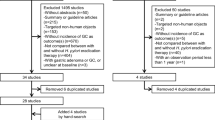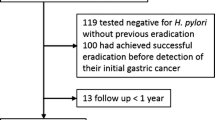Abstract
The impact of different Helicobacter pylori (H. pylori) status (H. pylori negative, H. pylori eradication and H. pylori persistence) on the development of metachronous gastric lesions after endoscopic resection of early gastric cancer is not well defined. Thus, a systematic review and meta-analysis was performed to investigate this relationship. Two authors independently searched the electronic databases (Pubmed, Embase, the Cochrane Library and Web of Science) through March 2018, without language restriction. Pooled risk ratio for metachronous gastric lesions with regard to H. pylori status was calculated using fixed- or random-effects models, and heterogeneity and publication bias were also measured. 20 eligible studies were finally identified in systematic review, and 17 out of 20 studies were further included in meta-analysis. H. pylori eradication was associated with overall 50% lower odds of metachronous events (RR = 0.50; 95 % CI 0.41–0.61). Pooled risk ratios for metachronous gastric neoplasm were 0.85 (95 % CI 0.43–1.68) between H. pylori-eradicated and -negative patients, and 0.63 (95 % CI 0.35–1.12) between H. pylori-negative and -persistent patients, respectively. In conclusion, based on the best available evidence, eradication of H. pylori can provide protection against secondary gastric neoplasm, and this quantitative benefit seemed greater than among asymptomatic individuals. Metachronous risk seems comparable between H. pylori-eradicated and -negative population, or between H. pylori-negative and -persistent patients.








Similar content being viewed by others
References
Fukunaga S, Nagami Y, Shiba M, et al. Long-term prognosis of expanded-indication differentiated-type early gastric cancer treated with endoscopic submucosal dissection or surgery using propensity score analysis. Gastrointest Endosc. 2017;85:143–52.
Choi KS, Jung HY, Choi KD, et al. EMR versus gastrectomy for intramucosal gastric cancer: comparison of long-term outcomes. Gastrointest Endosc. 2011;73:942–8.
Abe S, Oda I, Minagawa T, et al. Metachronous gastric cancer following curative endoscopic resection of early gastric cancer. Clin Endosc. 2018;51:253–9.
Yoon H, Kim N, Shin CM, et al. Risk factors for metachronous gastric neoplasms in patients who underwent endoscopic resection of a gastric neoplasm. Gut Liver. 2016;10:228–36.
Kim H, Shin J, Bang B, et al. Risk factor of metachronous recurrence after endoscopic submucosal dissection for gastric epithelial neoplasm. Helicobacter. 2017;22:70–1.
Moon HS, Yun GY, Kim JS, et al. Risk factors for metachronous gastric carcinoma development after endoscopic resection of gastric dysplasia: retrospective, single-center study. World J Gastroenterol. 2017;23:4407–15.
Amieva M, Peek RM Jr. Pathobiology of Helicobacter pylori-Induced gastric cancer. Gastroenterology. 2016;150:64–78.
Uemura N, Mukai T, Okamoto S, et al. Effect of Helicobacter pylori eradication on subsequent development of cancer after endoscopic resection of early gastric cancer. Cancer Epidemiol Biomarkers Prev. 1997;6:639–42.
Fukase K, Kato M, Kikuchi S, et al. Effect of eradication of Helicobacter pylori on incidence of metachronous gastric carcinoma after endoscopic resection of early gastric cancer: an open-label, randomised controlled trial. Lancet. 2008;372:392–7.
Choi J, Kim S, Yoon H, et al. Eradication of Helicobacter pylori after endoscopic resection of gastric tumors does not reduce incidence of metachronous gastric carcinoma. Clin Gastroenterol Hepatol. 2014;12:793–800.
Choi IJ, Kook MC, Kim YI, et al. Helicobacter pylori therapy for the prevention of metachronous gastric cancer. N Engl J Med. 2018;378:1085–95.
Shiotani A, Uedo N, Iishi H, et al. Predictive factors for metachronous gastric cancer in high-risk patients after successful Helicobacter pylori eradication. Digestion. 2008;78:113–9.
Maehata Y, Nakamura S, Fujisawa K, et al. Long-term effect of Helicobacter pylori eradication on the development of metachronous gastric cancer after endoscopic resection of early gastric cancer. Gastrointest Endosc. 2012;75:39–46.
Kim SB, Lee SH, Bae SI, et al. Association between Helicobacter pylori status and metachronous gastric cancer after endoscopic resection. World J Gastroenterol. 2016;22:9794–802.
Ami R, Hatta W, Iijima K, et al. Factors associated with metachronous gastric cancer development after endoscopic submucosal dissection for early gastric cancer. J Clin Gastroenterol. 2017;51:494–9.
Schlemper RJ, Riddell RH, Kato Y, et al. The Vienna classification of gastrointestinal epithelial neoplasia. Gut. 2000;47:251–5.
Juni P, Altman DG, Egger M. Systematic reviews in health care: assessing the quality of controlled clinical trials. BMJ. 2001;323:42–6.
Kim SY, Park JE, Lee YJ, et al. Testing a tool for assessing the risk of bias for nonrandomized studies showed moderate reliability and promising validity. J Clin Epidemiol. 2013;66:408–14.
Higgins JP, Thompson SG, Deeks JJ, et al. Measuring inconsistency in meta-analyses. BMJ. 2003;327:557–60.
Egger M, Davey Smith G, Schneider M, et al. Bias in meta-analysis detected by a simple, graphical test. BMJ. 1997;315:629–34.
Moher D, Liberati A, Tetzlaff J, et al. Preferred reporting items for systematic reviews and meta-analyses: the PRISMA statement. Ann Intern Med. 2009;151:264–9.
Nakagawa S, Asaka M, Kato M, et al. Helicobacter pylori eradication and metachronous gastric cancer after endoscopic mucosal resection of early gastric cancer. Aliment Pharmacol Ther. 2006;24:214–8.
Han JS, Jang JS, Choi SR, et al. A study of metachronous cancer after endoscopic resection of early gastric cancer. Scand J Gastroenterol. 2011;46:1099–104.
Kim HJ, Hong SJ, Ko BM, et al. Helicobacter pylori eradication suppresses metachronous gastric cancer and cyclooxygenase-2 expression after endoscopic resection of early gastric cancer. Korean J Helicobacter Up Gastrointest Res. 2011;11:117–23.
Bae SE, Jung HY, Kang J, et al. Effect of Helicobacter pylori eradication on metachronous recurrence after endoscopic resection of gastric neoplasm. Am J Gastroenterol. 2014;109:60–7.
Kim YI, Choi IJ, Kook MC, et al. The association between Helicobacter pylori status and incidence of metachronous gastric cancer after endoscopic resection of early gastric cancer. Helicobacter. 2014;19:194–201.
Kwon YH, Heo J, Lee HS, et al. Failure of Helicobacter pylori eradication and age are independent risk factors for recurrent neoplasia after endoscopic resection of early gastric cancer in 283 patients. Aliment Pharmacol Ther. 2014;39:609–18.
Jung S, Park CH, Kim EH, et al. Preventing metachronous gastric lesions after endoscopic submucosal dissection through Helicobacter pylori eradication. J Gastroenterol Hepatol. 2015;30:75–81.
Chung C-S, Woo HS, Chung J-W, et al. Risk factors for metachronous recurrence after endoscopic submucosal dissection of early gastric cancer. J Korean Med Sci. 2017;32:421–6.
Han SJ, Kim SG, Lim JH, et al. Long-term effects of Helicobacter pylori eradication on metachronous gastric cancer development. Gut Liver. 2018;12:133–41.
Kwon Y, Jeon S, Nam S, et al. Helicobacter pylori infection and serum level of pepsinogen are associated with the risk of metachronous gastric neoplasm after endoscopic resection. Aliment Pharmacol Ther. 2017;46:758–67.
Seo JY, Lee DH, Cho Y, et al. Eradication of Helicobacter pylori reduces metachronous gastric cancer after endoscopic resection of early gastric cancer. Hepatogastroenterology. 2013;60:776–80.
Jeong YH, Lee SH, Sohn SH, et al. The effect of Helicobacter pylori eradication on metachronous gastric cancer after endoscopic submucosal resection. United Euro Gastroenterol J. 2015;3:A122.
Yoon SB, Park JM, Lim CH, et al. Effect of Helicobacter pylori eradication on metachronous gastric cancer after endoscopic resection of gastric tumors: a meta-analysis. Helicobacter. 2014;19:243–8.
Bang CS, Baik GH, Shin IS, et al. Helicobacter pylori eradication for prevention of metachronous recurrence after endoscopic resection of early gastric cancer. J Korean Med Sci. 2015;30:749–56.
Lee YC, Chiang TH, Chou CK, et al. Association between Helicobacter pylori eradication and gastric cancer incidence: a systematic review and meta-analysis. Gastroenterology. 2016;150:1113–24.
Fuccio L, Zagari RM, Eusebi LH, et al. Meta-analysis: can Helicobacter pylori eradication treatment reduce the risk for gastric cancer? Ann Intern Med. 2009;151:121–8.
Ford AC, Forman D, Hunt RH, et al. Helicobacter pylori eradication therapy to prevent gastric cancer in healthy asymptomatic infected individuals: systematic review and meta-analysis of randomised controlled trials. BMJ. 2014;348:g3174.
Li X. Effect of Helicobacter pylori eradication timing on metachronous recurrence after endoscopic submucosal dissection of early gastric cancer. J Dig Dis. 2017;18:122–3.
Huh CW, Youn YH, Jung DH, et al. Early attempts to eradicate Helicobacter pylori after endoscopic resection of gastric neoplasm significantly improve eradication success rates. PLoS One. 2016;11:e0162258.
Yang HJ, Kim SG, Lim JH, et al. Surveillance strategy according to age after endoscopic resection of early gastric cancer. Surg Endosc. 2018;32:846–54.
Gisbert JP, Pajares JM. Review article: 13C-urea breath test in the diagnosis of Helicobacter pylori infection—a critical review. Aliment Pharmacol Ther. 2004;20:1001–17.
Kwon YH, Kim N, Lee JY, et al. The diagnostic validity of citric acid-free, high dose (13)C-urea breath test after Helicobacter pylori eradication in Korea. Helicobacter. 2015;20:159–68.
Acknowledgements
This article was supported by the National Natural Science Foundation of China (81672410).
Author information
Authors and Affiliations
Corresponding author
Ethics declarations
Conflict of interest
All authors have no potential conflict of interest relevant to this article.
Electronic supplementary material
Below is the link to the electronic supplementary material.
Rights and permissions
About this article
Cite this article
Xiao, S., Li, S., Zhou, L. et al. Helicobacter pylori status and risks of metachronous recurrence after endoscopic resection of early gastric cancer: a systematic review and meta-analysis. J Gastroenterol 54, 226–237 (2019). https://doi.org/10.1007/s00535-018-1513-8
Received:
Accepted:
Published:
Issue Date:
DOI: https://doi.org/10.1007/s00535-018-1513-8




